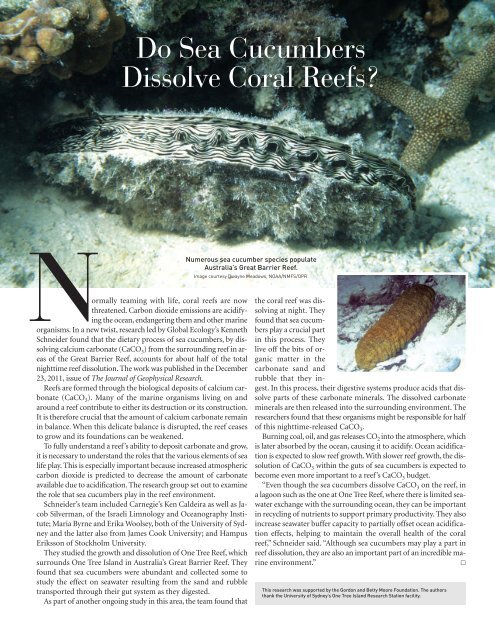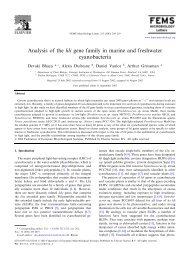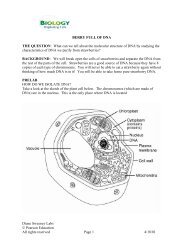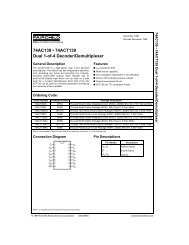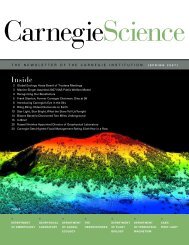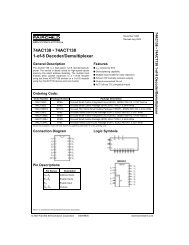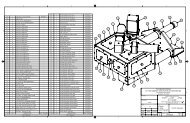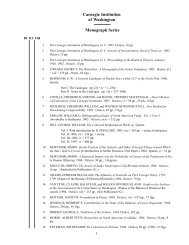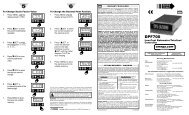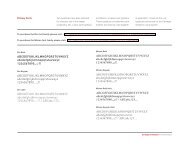The Newsletter of the Carnegie Institution - Carnegie Institution for ...
The Newsletter of the Carnegie Institution - Carnegie Institution for ...
The Newsletter of the Carnegie Institution - Carnegie Institution for ...
Create successful ePaper yourself
Turn your PDF publications into a flip-book with our unique Google optimized e-Paper software.
Do Sea Cucumbers<br />
Dissolve Coral Reefs?<br />
Normally teaming with life, coral reefs are now<br />
threatened. Carbon dioxide emissions are acidifying<br />
<strong>the</strong> ocean, endangering <strong>the</strong>m and o<strong>the</strong>r marine<br />
organisms. In a new twist, research led by Global Ecology’s Kenneth<br />
Schneider found that <strong>the</strong> dietary process <strong>of</strong> sea cucumbers, by dissolving<br />
calcium carbonate (CaCO 3 ) from <strong>the</strong> surrounding reef in areas<br />
<strong>of</strong> <strong>the</strong> Great Barrier Reef, accounts <strong>for</strong> about half <strong>of</strong> <strong>the</strong> total<br />
nighttime reef dissolution. <strong>The</strong> work was published in <strong>the</strong> December<br />
23, 2011, issue <strong>of</strong> <strong>The</strong> Journal <strong>of</strong> Geophysical Research.<br />
Reefs are <strong>for</strong>med through <strong>the</strong> biological deposits <strong>of</strong> calcium carbonate<br />
(CaCO 3 ). Many <strong>of</strong> <strong>the</strong> marine organisms living on and<br />
around a reef contribute to ei<strong>the</strong>r its destruction or its construction.<br />
It is <strong>the</strong>re<strong>for</strong>e crucial that <strong>the</strong> amount <strong>of</strong> calcium carbonate remain<br />
in balance. When this delicate balance is disrupted, <strong>the</strong> reef ceases<br />
to grow and its foundations can be weakened.<br />
To fully understand a reef’s ability to deposit carbonate and grow,<br />
it is necessary to understand <strong>the</strong> roles that <strong>the</strong> various elements <strong>of</strong> sea<br />
life play. This is especially important because increased atmospheric<br />
carbon dioxide is predicted to decrease <strong>the</strong> amount <strong>of</strong> carbonate<br />
available due to acidification. <strong>The</strong> research group set out to examine<br />
<strong>the</strong> role that sea cucumbers play in <strong>the</strong> reef environment.<br />
Schneider’s team included <strong>Carnegie</strong>’s Ken Caldeira as well as Jacob<br />
Silverman, <strong>of</strong> <strong>the</strong> Israeli Limnology and Oceanography Institute;<br />
Maria Byrne and Erika Woolsey, both <strong>of</strong> <strong>the</strong> University <strong>of</strong> Sydney<br />
and <strong>the</strong> latter also from James Cook University; and Hampus<br />
Eriksson <strong>of</strong> Stockholm University.<br />
<strong>The</strong>y studied <strong>the</strong> growth and dissolution <strong>of</strong> One Tree Reef, which<br />
surrounds One Tree Island in Australia’s Great Barrier Reef. <strong>The</strong>y<br />
found that sea cucumbers were abundant and collected some to<br />
study <strong>the</strong> effect on seawater resulting from <strong>the</strong> sand and rubble<br />
transported through <strong>the</strong>ir gut system as <strong>the</strong>y digested.<br />
As part <strong>of</strong> ano<strong>the</strong>r ongoing study in this area, <strong>the</strong> team found that<br />
Numerous sea cucumber species populate<br />
Australia’s Great Barrier Reef.<br />
Image courtesy Dwayne Meadows, NOAA/NMFS/OPR<br />
<strong>the</strong> coral reef was dissolving<br />
at night. <strong>The</strong>y<br />
found that sea cucumbers<br />
play a crucial part<br />
in this process. <strong>The</strong>y<br />
live <strong>of</strong>f <strong>the</strong> bits <strong>of</strong> organic<br />
matter in <strong>the</strong><br />
carbonate sand and<br />
rubble that <strong>the</strong>y ingest.<br />
In this process, <strong>the</strong>ir digestive systems produce acids that dissolve<br />
parts <strong>of</strong> <strong>the</strong>se carbonate minerals. <strong>The</strong> dissolved carbonate<br />
minerals are <strong>the</strong>n released into <strong>the</strong> surrounding environment. <strong>The</strong><br />
researchers found that <strong>the</strong>se organisms might be responsible <strong>for</strong> half<br />
<strong>of</strong> this nighttime-released CaCO 3 .<br />
Burning coal, oil, and gas releases CO 2 into <strong>the</strong> atmosphere, which<br />
is later absorbed by <strong>the</strong> ocean, causing it to acidify. Ocean acidification<br />
is expected to slow reef growth. With slower reef growth, <strong>the</strong> dissolution<br />
<strong>of</strong> CaCO 3 within <strong>the</strong> guts <strong>of</strong> sea cucumbers is expected to<br />
become even more important to a reef’s CaCO 3 budget.<br />
“Even though <strong>the</strong> sea cucumbers dissolve CaCO 3 on <strong>the</strong> reef, in<br />
a lagoon such as <strong>the</strong> one at One Tree Reef, where <strong>the</strong>re is limited seawater<br />
exchange with <strong>the</strong> surrounding ocean, <strong>the</strong>y can be important<br />
in recycling <strong>of</strong> nutrients to support primary productivity. <strong>The</strong>y also<br />
increase seawater buffer capacity to partially <strong>of</strong>fset ocean acidification<br />
effects, helping to maintain <strong>the</strong> overall health <strong>of</strong> <strong>the</strong> coral<br />
reef,” Schneider said. “Although sea cucumbers may play a part in<br />
reef dissolution, <strong>the</strong>y are also an important part <strong>of</strong> an incredible marine<br />
environment.”<br />
<br />
This research was supported by <strong>the</strong> Gordon and Betty Moore Foundation. <strong>The</strong> authors<br />
thank <strong>the</strong> University <strong>of</strong> Sydney’s One Tree Island Research Station facility.


